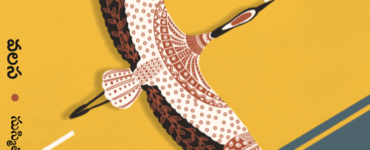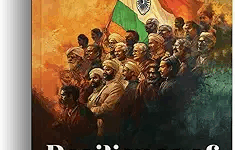My columns about books often begin with the cover, that being our first point of interaction with any work. Clare Thorp rightly says in her BBC column that the cover determines the book’s personality. The moment I saw the bright yellow cover of Sayan Aich Bhowmik’s I will Come with a Lighthouse it filled me with a sense of happy anticipation. As I picked up the book to read, at the end of a tiring day, the dazzling cover with a small graffiti of a light house sketched to stand for the ‘L’ had a cheerful effect, instantly transporting me to an awaited world of poetry. Once you dive into the world of Sayan Bhowmik’s anthology, the poems do not disappoint. They come with a freshness of thought and metaphors. Even though there is a general sense of loss and grief spread across the pages of this anthology, the poems please because of their aestheticism.
“Writing a poem …is a kind of possible love affair between something like the heart (that courageous but also shy factory of emotion) and the learned skills of the conscious mind. They make appointments with each other, and keep them, and something begins to happen. Or, they make appointments with each other but are casual and often fail to keep them: count on it, nothing happens”, these are Mary Oliver’s words in A Poetry Handbook.
 In Bhowmik’s poems the appointments of heart and mind are definitely kept and ‘something begins to happen’ too. The heart and the conscious mind come together to create poems that are both intelligently crafted and emotionally stirring. This slim and beautifully made anthology, divided into four sections, consisting of forty poems, begins with a poem titled ‘The Moths’ which, in the space of a few lines traverse its journey of the city from Calcutta to Kolkata, a journey as much temporal as metaphorical. The city is Janus – double faced – one looking ahead and another backward, much like the poet, who lives in the present, yet cannot leave his past.
In Bhowmik’s poems the appointments of heart and mind are definitely kept and ‘something begins to happen’ too. The heart and the conscious mind come together to create poems that are both intelligently crafted and emotionally stirring. This slim and beautifully made anthology, divided into four sections, consisting of forty poems, begins with a poem titled ‘The Moths’ which, in the space of a few lines traverse its journey of the city from Calcutta to Kolkata, a journey as much temporal as metaphorical. The city is Janus – double faced – one looking ahead and another backward, much like the poet, who lives in the present, yet cannot leave his past.
My Janus city has two names
both quiet like people
who have already removed themselves
from telephone directories.
Cities make an appearance in Bhowmik’s poems, often burdened with a sense of loss, aware of the “unclaimed letters at the post office” (15). In grandmother’s stories, Dhaka, Calcutta and Sylhet came together like ‘pashmina threads of stories’ (45), bringing in the reference of another city, torn by violence, Kashmir. The trauma of violence and separation as well as missing loved ones tie the cities together in an unbreakable bond. The second part of this poem is titled as Kashmir:
“Here I am
writing about my favourite hell
holding a tourist brochure in hand
wondering at the delusion
that proclaims, “Welcome to the heaven on Earth”. (46)
A mellowed sense of grief and pain spreads across the entire anthology. The poet is keenly sensitive to the battered soul of humanity, pained at the mindless violence and apathy. Sarcasm is his only weapon to express that rage, “The wind blows through the bullet holes/ decorating my city’s punctured lungs” (47).
Like the burden of dead albatross, he cannot shake off the legacy of partition wounds. In the section ‘Political Poems’, places carry the weight of violence and death – “Once done, I sit at my desk, / writing about plots of land, never too small/ for a new grave” (51). And cities stand for a history that is soaked in blood – “… Lahore, Delhi, Dhaka./ From the corners of the dog-eared pages/ where history has bookmarked the years with blood.” (50)
There is a softness of grief that wraps Sayan Bhowmik’s poems. In the section ‘On Love’, the poems speak of loss, love and melancholy in the same breath – I chisel my name/ on the sadness of the sky’s dark blue” (32). Love is not just about reciprocation, it is a wait, loss or even death. It is about the unsurmountable distance between two people too – “You have uprooted every milestone/ and brought down every light house/ that could have led me to you” (34). A poet speaks in many voices and many moods. The trajectory of love also speaks of mutuality of desire –
Your clothes catch fire
and in that glow
I see your lips move
and write in air
my names from previous births. (35)
Some recurring images bring out the mellowness of memories. Grandmother and her stories refresh the anxieties of partition, yet also remind us of more secular days:
“There have been evenings
when my grandmother would weave stories…
and say, “Some yarns were sharper than knives.” (45)
In another poem he says,
“Cities in my grandmother’s time
were anchored to the busiest of ghats
so they wouldn’t drift away” (52)
Another recurring image is of the post boxes and letters. In a world of growing increasingly virtual, post boxes bring back the idea of an anchorage, much like cities in ‘grandmother’s time’. The poet seeks tangibility in a world that is becoming intangible with every passing day. The post boxes and letters become markers of the physicality of one’s presence and places. They speak of journeys at various levels. In the poem ‘The Last Time’, emptying of “the post-box outside his door” signifies the man’s preparation towards his final journey, while ‘The Stamp Collector’ sorts postcards signifying the journeys he had already undertaken. Each poem is a journey – the poet’s travel to understand and engage with a world in which he lives.
 The poems that intrigued me the most are the ones classified under the sub-heading ‘On Writing’. The very first poem in this section, titled as ‘Choices’ speaks about the nature of languages and how the subject chooses a language for itself. It reminds me of Susan Basnett’s words that language is “the heart within the body of culture”. In a world where language has been the cause of enough bloodshed, such generosity of thoughts, embracing and accepting the linguistic diversity is not just refreshing, but also much required. As I read through the poems in this section, I become aware of the presence of other languages though the poems are composed in English. Urdu rules this section of the anthology as Agha Shahid Ali and Faiz make their presence felt. As I read, it seems to me that this section is the culmination of thoughts that have been building up throughout this collection of poems. The anxieties of partition, violence, relationships, languages, loss and death that made the contours of the poet’s mindscape, come together in this section.
The poems that intrigued me the most are the ones classified under the sub-heading ‘On Writing’. The very first poem in this section, titled as ‘Choices’ speaks about the nature of languages and how the subject chooses a language for itself. It reminds me of Susan Basnett’s words that language is “the heart within the body of culture”. In a world where language has been the cause of enough bloodshed, such generosity of thoughts, embracing and accepting the linguistic diversity is not just refreshing, but also much required. As I read through the poems in this section, I become aware of the presence of other languages though the poems are composed in English. Urdu rules this section of the anthology as Agha Shahid Ali and Faiz make their presence felt. As I read, it seems to me that this section is the culmination of thoughts that have been building up throughout this collection of poems. The anxieties of partition, violence, relationships, languages, loss and death that made the contours of the poet’s mindscape, come together in this section.
Though the anthology is divided into four different sections, ‘loneliness’ seems to be the dominant emotion. The poet is in a perpetual quest -either for the beloved, or for his city or for his words. He is a seeker undertaking a solitary journey. The poems are the joining dots for that quest. The poet seeks meaning in this world full of bloodshed, death and missing people. These poems are expressions of a sensitive and empathic soul, in a journey across a world that is often cruel and ruthless, but also soft like grandma’s stories.
The anthology I will Come with a Lighthouse fulfils its promise by bringing the readers some remarkable poems that glows in the general darkness of the contemporary world. It is a slim volume, but the poems have a depth that requires serious engagement of the readers.
*









Add comment